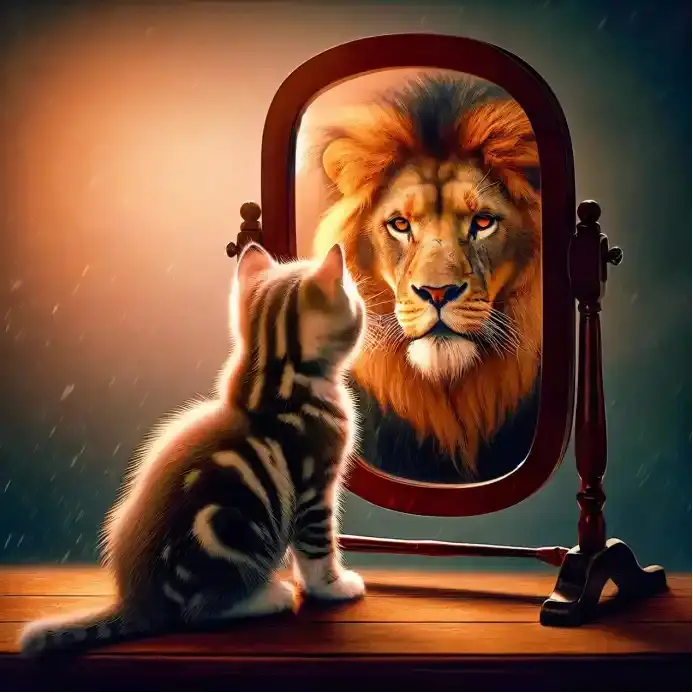To change your life, learn to trust yourself in the future
Being human is difficult. We know the kinds of choices we have to make, and we intend to take them seriously, but when the time comes, we don't. We want to lose weight, but we eat sweets. We want to get fit, but we don't move off the couch. We want to save money, but we buy a plane ticket to Italy. Funnily enough, scientists can't agree on why. The prevailing idea in both psychology and popular culture is that one part of our brain is rational and knows what is good for us, and another part is impulsive and wants bad things. These two parts are constantly battling, and eventually the rational part gets tired and gives up. It's a depressing picture, but what you haven't heard of is that in recent years a competing model of addiction studies has emerged. In this concept, the human mind does not contain two warring parts, but rather a unified system that prioritizes immediate reward options over those that come to fruition later. The struggle, then, is not between good and evil, but between the future and the present. What's interesting about this way of looking at things is that not only does it explain why some people manage to win the battle against temptations, but it also gives the rest of us a strategy for how to do the same.
Recommend
Show key points
- Human behavior often contradicts intention, as we frequently fail to act on future-focused goals in favor of immediate gratification.
- The traditional belief that our rational and impulsive selves battle each other is being challenged by new theories that view the mind as a unified system that favors near-term rewards.
- Self-control is not a matter of willpower as a finite resource but of how we perceive and prioritize present versus future rewards.
- ADVERTISEMENT
- Humans differ from animals in their capacity to visualize long-term outcomes, which can enhance self-discipline when the future is made emotionally and mentally vivid.
- Confidence in resisting temptation is built not through affirmations but through consistently witnessing ourselves succeed at small, manageable actions.
- A two-step strategy—forming a simple rule and following it—can create a foundation of self-trust that gradually leads to major behavioral changes.
- By reinforcing these patterns, we eventually reshape our desires and identity, making positive change not just sustainable, but intrinsic to who we are.
Restraint:

Of course, if we are going to talk about self-control, we have to talk about a famous experiment conducted in the late sixties and early seventies of the last century in which children as young as 4 years old were given the choice between getting one piece of candy immediately, or on two after fifteen minutes. Years later, when researchers examined participants in that trial, they found that those who waited performed better in life by any measure. They concluded that they possessed willpower. Willpower, like muscles, eventually drains and stops working. But later scientists found no evidence for this idea of attrition, ruling out the idea of muscle.
What is willpower?

If it's not a muscle, what is it? The roots of the alternative answer go back to studies conducted in the same period on pigeons, which showed that pigeons prefer the biggest reward when the two rewards are far away, but choose the smaller ones when they are close.
Imagine walking, and at a distance you see a tree at the foot of a mountain. The tree looks smaller than the mountain. But as you get closer to the tree, it starts to swell faster than a mountain, until the two eventually get the same size. Then the ratio shifts; as you get closer and closer, the tree seems bigger and bigger, until it becomes everything it sees, when it reaches its vicinity.
Scientists have realized that humans change their minds in the same way, and their priorities are reversed. Suppose you want to wake up at five in the morning to study. The alarm goes off, but it's pitch dark and you find yourself slipping back into the cushion's beautiful lap. Of course, when a comfortable pillow is only a few centimeters away, its reward is huge compared to its distant alternative, the exam. You choose the smaller reward because it is close.
But despite this shift in priorities, we are not forced to succumb to temptation, and there is a way to respond. Unlike pigeons, humans have the ability to predict future rewards – not just one, but a series of them that extend into the future. When you're struggling to get out of bed early, the trade-off isn't actually between one moment of succumbing to temptation, and one moment of future satisfaction. It's between a moment of giving up now versus the many years you'll spend enjoying a successful career. What you have to do then is mentally drop yourself in the future so you can experience the satisfaction of tomorrow's rewards, today. Interestingly, researchers have found that people who strongly empathize with their future selves are better at self-control. The ability to imagine ourselves in the future is similar to the ability to recognize the positive and negative consequences of our decisions.
But to reach this ability there is a big obstacle to overcome: trust. When I try to get out of bed to work or study, I succeed when I imagine all the future benefits of my work or study. But I won't get these benefits unless I keep waking up early. If I don't really believe that I will be able to continue resisting temptation, and if I think I might end up falling and hitting the snooze button tomorrow or the next day, I can't imagine those future rewards, because they will never arrive. If we believe in ourselves enough to think we won't give in to temptation, that temptation won't be an option, and we'll stop wanting it. To overcome temptations and achieve change, we need to dispel the fog of self-doubt and develop confidence in our future behavior.
But how can you do it?

If you think you can increase your confidence by uttering affirmations in front of the mirror, think again. Studies have found that on a subconscious level, the way we shape our beliefs about ourselves is not about what we say or even what we think, but about what we actually see ourselves doing. That is, if we want to change our beliefs, we first have to change our behavior.
But this is paradoxical. In order to change your behavior, you have to trust yourself. But you won't trust yourself if everything you've seen in the past is untrustworthy behavior. The solution is to stop worrying about behavior and focus on trust. The way to do this is through the following two-step process:
Step One: Choose a simple rule for yourself, a rule that is so simple and so clear that you can't fail.
Second Step: Make sure to follow the first step.
It's her! The goal is not to build a habit, but to create a pattern of evidence for your brain to notice. Find highly actionable behavior to adopt, and then focus on doing it, no matter what. For example, the person who wants to wake up early says, "I'll set the alarm five minutes early." As simple as that! The goals are so small that they seem almost useless. But keep it. When you gain credibility, you can use your new power to set more ambitious goals, like waking up ten minutes earlier, then fifteen, and so on... Until waking up at five in the morning is nothing more than a simple stage like the previous ones. Because, over time, the project becomes part of your identity, and your investment becomes so enormous that you can't let it slip out of your hands. Not only is it easy to continue, it becomes difficult to stop.
What's interesting about this process is that although the science underpinning it is new, the technology itself has been around for years, it's not so complicated that people stumble upon it on their own.

Many felt trapped by their behavior, but managed to break free. They did not do this by learning new habits, but by learning to change what they wanted. This new way of looking at self-control allows us to hope. Imagine a state of existence in which we can live life the way we want without conflict, and change for the better, forever.








